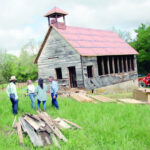The city of Cassville had an opportunity over the past year to possibly join the National Flood Insurance Program (NFIP) without retrofitting buildings or making major changes to Main Street — but the moment has passed.
Todd Tucker, AICP, Natural Hazards Program specialist in the mitigation division of FEMA Region VII, said the city’s NFIP history dates back to the 1970s, when he said the city was suspended in 1977 for failing to adopt adequate floodplain regulations. City officials have said they left voluntarily in 1978, as the majority of the city would have been in the floodplain, greatly limiting any new construction.
Tucker said after a period of suspension, a community may be reinstated if it meets certain conditions.
“To regain eligibility for the NFIP, a community must adopt adequate floodplain management regulations and provide evidence of actions taken to remedy non-conforming floodplain development (i.e., development that aggravates flood hazards or is not adequately protected from flood hazards) which occurred during the period of suspension,” Tucker said. “The remedial actions necessary for reinstatement are determined on a case-by-case basis and may include community actions such as removing floodway obstructions, conducting a study to map the change in flood hazards, surveying the lowest floor of existing buildings, notifying property owners of their flood risk or retrofitting structures to provide adequate protection against flooding.”
Cassville considered rejoining the NFIP in 2015 after two floods over two days that impacted 30 businesses and 20 homes, causing more than $900,000 in damages. At the time, rejoining would require the city to revert to the 1970s construction requirements, which officials called a non-starter for its businesses due to cost.
Any structure built after 1977 would require the lowest floor, including the basement, to meet the 100-year flood elevation level, and any future structures would likewise have to meet the 100-year flood elevation level.
In January 2021, Steve Walensky, Cassville city administrator, said the city hoped to get some allowances from state and national agencies to bypass that elevation requirement. A possible re-entry was prompted by participation in the Section 205 program with the Army Corps of Engineers, working with the city on feasibility study to identify mitigation measures for implementation that would reduce the flood hazard.
The Section 205 program is a two-part process — a feasibility study and a project. The Corps pays for up to $100,000 in cost for the feasibility study, then the project is a 65 percent federal, 35 percent local split.
Walensky was recommended by the Corps to apply, and said he was clear that the city was not part of the NFIP, nor did it plan to be at the time.
After the study was done and the city was waiting to hear if it would move on to the second part of the process, it was determined the city would have to be in the NFIP to do so.
Because of that requirement, Cassville initiated conversations with FEMA to get back into the NFIP, and was making headway.
“FEMA Region VII affirmed the city could use these studies and mitigation measures as part of the remedial action plan for reinstatement, along with adopting floodplain development standards that would protect new construction and retrofit existing construction as it became damaged,” Tucker said. “These actions would demonstrate the city’s commitment to mitigate the flood hazard through participation in the NFIP in conjunction with other mitigation programs.”
The city and FEMA began planning a meeting in June 2021 to discuss the possibility of rejoining, but that meeting was canceled due to an increase in COVIDpositive cases locally.
“At that time, FEMA Region VII offered to host a virtual meeting; the City declined,” Tucker said. “FEMA made additional offers to meet virtually; the City declined each offer, expressing the desire for an in-person meeting. In early April 2022, FEMA offered to schedule an in-person meeting in Cassville to answer questions about the NFIP; the City declined.”
Walensky said the city requested the meeting to better-understand the program and any changes required to get in.
“The problem was, every time we asked a question to FEMA, they would point us to government documents to find our answers,” Walensky said. “I was in the hot seat because I would send questions to FEMA and they would send me a link to a 175-page document, and by the end, I had more questions than answers.
“The Cassville City Council wanted its constituents to have the freedom to talk to the experts, because there is so much to it. We had more than 40 people ready to attend that meeting, because they had questions we could not articulate the answers for.”
Walensky said FEMA did offer virtual meetings, but the Council put a heavy emphasis on the in-person meeting.
“It was an opportunity for people to talk to FEMA directly and assure the Council was not making a decision without consulting the people who would be impacted,” he said.
After the virtual meetings were offered, FEMA set a deadline of March 1 to accept or decline the offer, which was a surprise to the council.
“That put the Council on its heels, because we couldn’t get answers to the questions we needed before joining,” he said. “They canceled the night before the meeting, so I think it is on them to let the offer stand, but they won’t do that, and I don’t know why.”
While the deadline for this opportunity has passed, there may be another. Tucker said the remedial actions necessary for reinstatement are determined on a case-by-case basis, and the plan developed in 2019 included the city’s efforts and partnership with other agencies and commitment to identify flood reduction measures for implementation that further reduce the flood hazard. In short, Cassville may have a chance to rejoin again if it re-applies to the Section 205 program.
“Since the mitigation study is no longer available, the city would need to take alternative remedial action to identify and implement flood reduction measures,” Tucker said. “The city may apply for reinstatement to the NFIP at any time, provided the city adopts adequate floodplain management regulations and provides evidence of actions taken to remedy non-conforming floodplain development (i.e., development that aggravates flood hazards or is not adequately protected from flood hazards) which occurred during the period of suspension.”
Walensky said the Council has not changed its position.
“The Council is open if they come down and do the meeting,” he said. “They just want to meet in person.”
Without rejoining the NFIP, Tucker said the residents and businesses remain vulnerable and lack access to federally-backed flood insurance, available whether there is a disaster declaration or not.
“In addition, the citizens and businesses do not have access to the various resources that become available after a federal disaster is declared such as low-interest recovery loans (Fannie Mae, Freddie Mac, FHA, VA, USDA, SBA, etc.), grants, and individual assistance for repairing or rebuilding flood-prone structures,” Tucker said. “Only communities that participate in the NFIP have access to these resources. Private loans [also] remain at risk should flood damages exceed the value of the private loan or an individual’s available resources for recovery.”
Tucker said another factor is the guarantee that all new development or construction in high risk flood areas would be built to resist flood damage and to protect lives from the flood hazard.
Walensky said the city will continue to do what it can for flood prevention and mitigation.
“We will continue to mitigate what we can, and some of the things we have done on our own have helped,” he said. “That’s all we can do until something else happens. We’ll make improvements as we can, keep it as clean as we can and hope Mother Nature doesn’t unload on us.”
NFIP
What: National Flood Insurance Program
Change: Cassville had offer to join program, but it expired
Why: City putting emphasis on in-person meeting for residents




